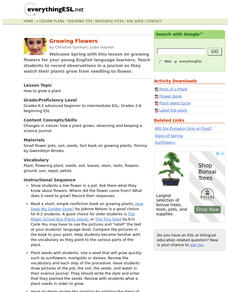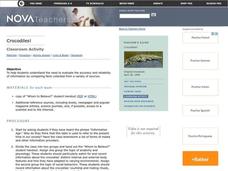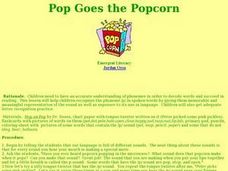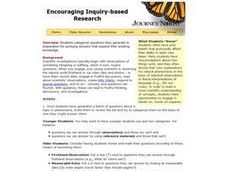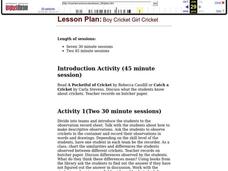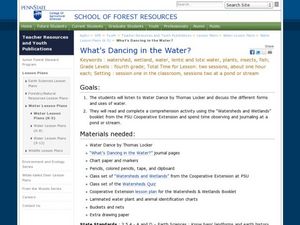Curated OER
Growing Flowers
Students grow flowers from seeds. They plant quick-growing seeds in a flower pot and consider what a seed needs to grow. They observe and record the growth of the planted seeds in science journals.
Curated OER
Climate Change
Students define and associate words with the topic of climate change while completing associated worksheets. They read and discuss articles about climate change including the effects of global warming and the greenhouse effect.
Virginia Department of Education
Logic and Conditional Statements
If there is a conditional statement, then there is a hypothesis and conclusion. Pupils learn how to identify the parts of conditional statements. Class members continue to work with conditional statements and rewrite them in their many...
Curated OER
Environet Lesson Plans
Eleventh graders conduct Internet research about basic ecological principles and current environmental issues. They participate in a variety of outdoor experiences and develop an "Outdoor Experiences Journal" that they keep for an...
Curated OER
I Wonder How the Manduca Life Cycle Compares To the Human Life Cycle...
Students study life cycles including developing their understanding of the human life cycle. They decide where they are in the human life cycle and provide reasons for that placement. They compare the human life cycle to that of the...
Curated OER
Crocodiles
Work on research procedures in this lesson, which prompts writers to collect and evaluate information pooled from a number of sources. They work in teams to collect information about crocodiles from different sources. They compare the...
Curated OER
The Water Cycle (Evaporation, Condensation, Precipitation)
The 3 steps of the water cycle, evaporation, condensation, and precipitation, are the focus of this lesson. After a neat demonstration of rain using hot water, a pie tin, and ice cubes, young scientists observe and discuss the elements...
Curated OER
Global Environmental Issues: Air and Water Pollution
Thinking about designing a project for your social studies or environmental science classes? Use an overview of a project that prompts class groups to research an environmental issue.
Curated OER
Stonewall and Beyond: Gay and Lesbian Issues
Help learners understand their own biases and how their perspectives may have been influenced by biased media sources. They keep a journal while viewing videos, exploring websites, and engaging in class discussions related to gay and...
Curated OER
Building on the Past
Students consider how the scientific advances of the past have contributed to the science topics reported on today in the Science Times section. After reading a current science article, they compare and contrast the way science was...
Curated OER
What We Need
First graders identify basic needs of plants. In this plant growth lesson, 1st graders observe types of plants and review the parts of a plant as well as the development of a seed. Students review related vocabulary and read The...
Curated OER
Seasons of Trees
Learners examine how trees change over time. For this forestry lesson, students read the book The Seasons of Arnold's Apple Tree and choose three trees to observe over a period of time. Learners record observations and seasonal changes...
Curated OER
Let's Create an Ecosystem
Seventh graders discover how an ecosystem works by creating one in class. In this Earth science lesson plan, 7th graders study vocabulary terms associated with ecosystem and read environment handouts. Students create an...
Curated OER
Japan and The Ring of Fire
Students engage in a study of the volcanic forces and earthquakes associated with The Ring of Fire in the Pacific Ocean. The people of Japan are researched in how they have dealt with living in the area. Also students write in journals...
Curated OER
The Middle Ages
Learners discuss the Middle Ages. In this social science lesson, students role-play that they are medieval lords, knights, and ladies who keep diaries. Learners write what they would have put in their diaries and decorate their diaries.
Curated OER
Space
First graders examine space in this unit of lessons. They create a KWL chart and write in their journals about space. They also examine the phases of the moon and identify the constellations.
Curated OER
Water and Ice
Learners explore the states of matter. In this physical science lesson, students observe what happens to water when it freezes and record observations. Learners then observe ice when it melts and record observations.
Curated OER
What Is Cloning?
Students differentiate between reproductive and therapeutic cloning and then use research, discussion, and writing in journals to examine their own personal opinions on these subjects.
Curated OER
POP! Goes the Popcorn!
Students complete a variety of activities based on examining corn and popcorn as one of the major crops of Kansas. They journal the results of the multidisciplinary activities in this unit.
Curated OER
Encouraging Inquiry-Based Research
Students categorize questions they generate in preparation for pursuing answers that expand their existing knowledge. They create KWL charts and respond to journal questions to enable them to inquire to their fullest capacity.
Curated OER
Reuse and Respect!
Students examine the concept of reusing trash to save the environment. In this environment activity, students examine the definition of the word reuse, and apply it by finding ways to reuse trash in their school. They talk about what...
Curated OER
Boy Cricket Girl Cricket
Students investigate crickets. In this series of cricket activities, students observe and chart crickets. Students discuss the differences between male and female crickets, record findings in a journal, handle crickets, and read a...
Curated OER
What's Dancing in the Water?
Young scholars learn about watershed, as well as the different forms and uses of water. In this water forms lesson plan, students brainstorm water sources and uses. Young scholars read the book Water Dance and discuss water examples....
Curated OER
Fantastic Friction!!!
Learners work in small groups to list at least 10 items that have movement or motion choosing one item from the list to use as a topic for the following questions: How does this item move? How can we slow down the movement? How can we...
